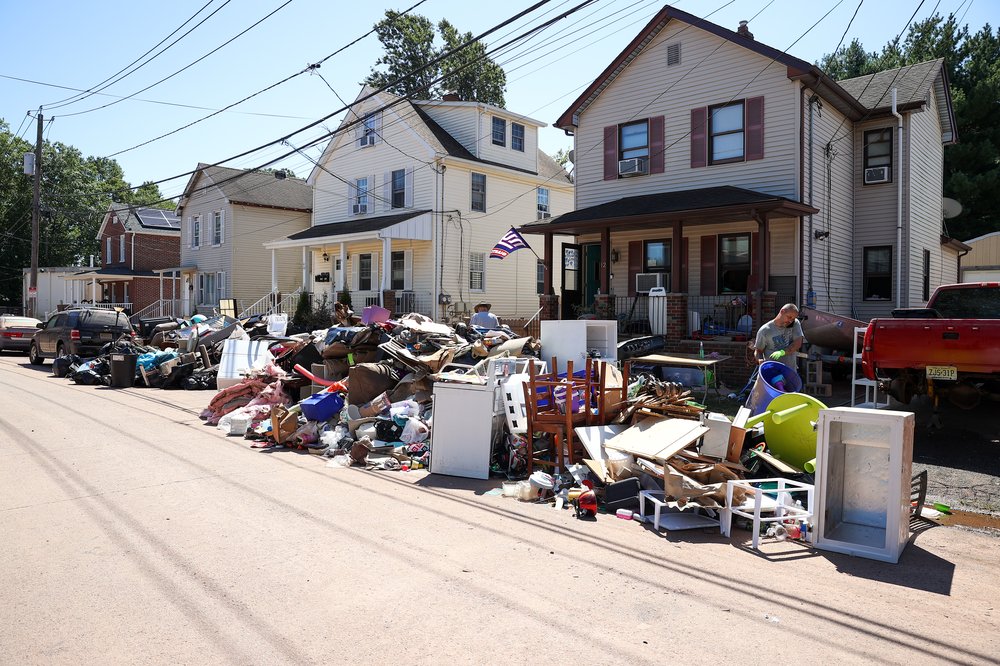New Jersey Hurricane Ida survivors face February deadline to apply for storm relief program
Feb. 17, 2025, 7:01 a.m.
New Jersey passed a law allowing homeowners hit by the 2021 storm to stop paying their mortgage for a year. Applications must be in by Feb. 26.

New Jersey residents still reeling from the damage Hurricane Ida wrought on their homes three years ago have just over a week to apply for a state program that can pause their mortgage payments for up to a year.
Gov. Phil Murphy signed a law in October 2024 providing 12 months of mortgage relief and protecting survivors of Hurricane Ida from foreclosure. The money owed doesn’t go away. Rather, the payments are tacked onto the end of the homeowner’s mortgage period.
The deadly September 2021 storm destroyed and damaged thousands of homes in the state. Its path of destruction left some residents displaced from their homes or put many into a state of debilitating debt trying to rebuild what they lost.
The 2024 law called for the state’s Department of Community Affairs to launch an online portal for survivors to apply for the mortgage relief. The agency was given 90 days to get the website up and running. It finally launched on Jan. 27. However, anyone interested in the program only has until Feb. 26 at 5 p.m. to apply.
The long wait for relief
Until recently, this particular piece of relief for Ida survivors didn’t look like it was a foregone conclusion.
The bill's first iteration passed the state Legislature unanimously in 2023. But Murphy conditionally vetoed it, saying he was concerned the program could create the potential for fraud. He asked lawmakers to add a provision requiring applicants to provide proof they had sought other forms of relief as a way to verify they’d suffered hardship from the storm. State lawmakers went back to work and once again unanimously passed a new version of the bill last October.
Leanna Jones, a Milford, New Jersey homeowner affected by the storm, said she applied for mortgage forbearance as soon as it opened.
“ I really need it. I am still working to get back on my feet to get recovered after Ida,” she said.
Jones remembers going into her basement on the night of the storm and seeing water pouring over her home's foundation.
“There was literally water pouring over the electrical panel,” she said.
Jones, a single mom, said she and her two kids had to be rescued from their home that night. When she returned to her property several days later, she said her house was “completely wrecked.” Her electrical and heating systems were ruined, along with a new washer and dryer she’d recently bought, she told Gothamist. The floors on the first story of her house had to be ripped out and replaced. She said she’s taken on a mountain of debt that she’s still paying off — along with trying to keep up with the mortgage payments.
”This mortgage forbearance is just going to give me some breathing room,” Jones said.
How it works – and who’s eligible
To be eligible for the forbearance, homeowners affected by the storm must also be enrolled in or have applied for other disaster assistance programs offered in the state. These other initiatives include the Homeowner Assistance and Recovery Program, which provides grants to impacted homeowners to restore their property, and the Blue Acres programs, which allows homeowners living in dangerous flood zones to sell their homes to the state to be torn down.
Jones said she believes she’s eligible for the mortgage forbearance because she’s currently going through the Blue Acres process. She said she’s still waiting to hear from the state about what they’ll offer her to purchase her property.
“[Mortgage forbearance would] enable me to not have to continue to pay into a property that I may end up having to sell back to the state,” she said.
The mortgage forbearance law says that the Department of Community Affairs has 90 days after the application period ends to inform applicants if they’ve been accepted or not. Jones said she’s already hearing from other survivors in her neighborhood that their applications have been processed. She said some homeowners have told her they’ve been denied, while others have been told to provide more information to the agency.
“I'm hoping that we start hearing acceptances soon too,” she said.
Those accepted will receive a certification of eligibility from the Department of Community Affairs to present to their mortgage servicer. According to the department’s website, mortgage companies are required to suspend principal and interest payments on the mortgage for a year. However, the forbearance doesn’t affect property tax and insurance payments.
14,000 acres in reported land miscalculations threaten NJ’s goal to build affordable homes 431 New Jersey municipalities meet key deadline, commit to affordable housing development 'Cocktail for disaster' — top Republican lawmaker says NJ botched affordable housing plans